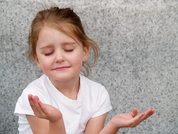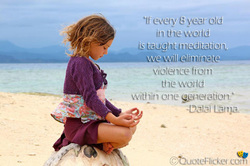SPIRITUAL LEARNING - The Sacred Child Within

So often we learn to hide our true selves and conform to a “persona” we feel is wanted by those we are seeking love and acceptance from. To be truly accepted and loved as we are, is transformational for all, and this is what we are striving for in our focus on the spiritual nurturance of the sacred child within.
We guide children to delve within their own being and connect to themselves. In this way, children develop a deep and authentic sense of self that is evoked from the inside out. It goes beyond outer identifications such as body/looks, roles, approval or rejection and allows for a deep self-awareness that supports authenticity, love, and acceptance of both self and others.
We nurture the sacred child within by:
-mindfulness and guided meditation as a child chooses
-honoring a child’s choices in all activities as is inherent in self-directed learning
We guide children to delve within their own being and connect to themselves. In this way, children develop a deep and authentic sense of self that is evoked from the inside out. It goes beyond outer identifications such as body/looks, roles, approval or rejection and allows for a deep self-awareness that supports authenticity, love, and acceptance of both self and others.
We nurture the sacred child within by:
- Trusting the inner guidance system within each child and within all of us, with our intention, actions, and responses.
- Cultivating this inner relationship as a source of strength, wisdom, calming center and inner compass.
- Allowing children to experience and voice their authentic feelings, emotions and heart, without judgment.
- Guiding children towards self-acceptance and self-love in all interactions and responses.
- Nurturing the connection to their inner being and inner guidance through:
-mindfulness and guided meditation as a child chooses
-honoring a child’s choices in all activities as is inherent in self-directed learning
SOCIAL EMOTIONAL LEARNING

As a culture we do not support feeling all our emotions. Most of us run from uncomfortable feelings, which in turn create within us unconscious reactive patterns and even disease. Statistics on CHILD depression, suicide, bullying, cutting and the number of children on drugs for depression, ADD, ADHD etc. are shocking and very much related to the current lack of focus on social emotional skill development as well as the inadequacy of the current education system.
Click to find a detailed explanation: "Teacher-Centered versus NLC Education".
The current school system unfortunately teaches children to fit in, to be quiet, sit still, focus on what they DID NOT do right, and ultimately to feel badly about who they are.This shuts down learning, creativity, individual voice, and movement, which are otherwise natural expressions of a child.
Over and over again studies on emotional intelligence have pointed to the significance of having tools to deal with our emotions and navigate our relationships for success in adult life.
The following list of vital social and emotional skills provided by The Collaborative for Academic Social and Emotional Learning CASEL are a major focus at SAGE:
These skills include:
- Self-awareness - recognizing your emotions and values as well as knowing your strengths and weaknesses
- Self-management - managing your emotions and behaviors to achieve your goals
- Empathy - showing understanding and compassion for others.
- Relationship skills - forming positive relationships, working in teams, dealing effectively with conflict
- Responsible decision making - making ethical, constructive choices about personal and social behavior
EMOTIONAL SKILLS

SAGE provides a safe environment where children and young adults learn to identify and process their feelings. This allows children to see that everyone experiences the same types of emotions, reactions and thoughts and this in itself can be transformative.
We teach children to release and process their internal world by assisting them in their day to day interactions as feelings in various situations arise. Learning companions are skilled in a multitude of approaches to guide individual children for their unique needs. For instance, we offer basic tools from non-directive play therapy such as the sand tray, puppets and dolls as well as other proven resources.Time and space is always provided for children to naturally process their emotions during pretend play and other activities. In addition we offer physical spaces to assist in freely expressing emotions such as sadness or anger in a prepared environment that allows them to release, center and calm with tools such as comforting blankets, music, batakas, mats, and other tools.We also offer lessons and circles where processing skills are taught more formally such as The Work by Byron Katie, The Presence Process by Peter Brown, and the Emotional Freedom Technique (EFT).
Learning to step back from a triggered emotion without reacting and instead, to choose a response, allows for self-mastery, self-awareness and self-control. For younger children this can be as simple as learning to pause to breathe, stop the impulse to hit, and then helping them to communicate their feelings and needs with words. Older children can learn compassionate communication, “I” messages and the steps to conflict resolution.
Allowing, understanding, and knowing how to positively express emotions leads not only to self awareness and self-acceptance, but also to empathy and compassion for others. Our world would improve drastically if the next generation had these skills.
We teach children to release and process their internal world by assisting them in their day to day interactions as feelings in various situations arise. Learning companions are skilled in a multitude of approaches to guide individual children for their unique needs. For instance, we offer basic tools from non-directive play therapy such as the sand tray, puppets and dolls as well as other proven resources.Time and space is always provided for children to naturally process their emotions during pretend play and other activities. In addition we offer physical spaces to assist in freely expressing emotions such as sadness or anger in a prepared environment that allows them to release, center and calm with tools such as comforting blankets, music, batakas, mats, and other tools.We also offer lessons and circles where processing skills are taught more formally such as The Work by Byron Katie, The Presence Process by Peter Brown, and the Emotional Freedom Technique (EFT).
Learning to step back from a triggered emotion without reacting and instead, to choose a response, allows for self-mastery, self-awareness and self-control. For younger children this can be as simple as learning to pause to breathe, stop the impulse to hit, and then helping them to communicate their feelings and needs with words. Older children can learn compassionate communication, “I” messages and the steps to conflict resolution.
Allowing, understanding, and knowing how to positively express emotions leads not only to self awareness and self-acceptance, but also to empathy and compassion for others. Our world would improve drastically if the next generation had these skills.
SOCIAL SKILLS

In addition to learning emotional skills, children and young adults need to learn the skills required to navigate friendships as well as peer and adult relationships. At SAGE we teach key social emotional skills through active reflection, role play, and interactive processes. We assist children and young adults to develop a strong sense of self and provide the skills needed to express and interact in empowered, positive ways. We teach perspective sharing and offer many processes for pair and group interaction, communication, mediation, conflict resolution and the expression of forgiveness and compassion. This is all done in course offerings as well as through the day to day modeled interactions and guided resolutions that naturally take place in the vibrant learning community of SAGE.
Skills to be developed include:
Skills to be developed include:
- Taking responsibility for reactions and feelings instead of going into blame and victim
- Setting healthy boundaries (How to say no in positive and empowered ways)
- Learning I- messages and practicing empowered and respectful ways to convey feelings and reactions
- Talking stick and council formats for discussion, mediation and perspective sharing
- Conflict resolution steps and processes (Montessori peace table, The Four Agreements by Ruiz, Compassion exercise, Ho' oponopono, etc.)
- Listening from the heart
- Problem solving and decision making strategies and processes